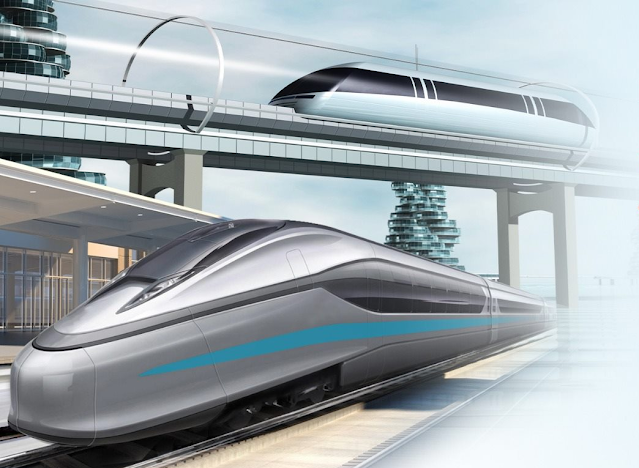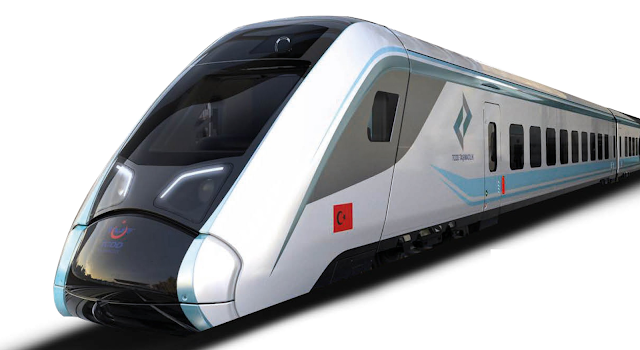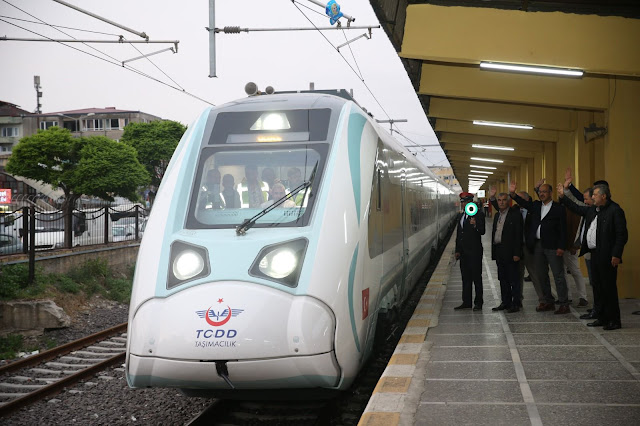By Stijn Mitzer and Joost Oliemans
The
past two decades have seen the modernisation of Türkiye's rail transport
on a broad basis – and the Turkish government appears dead set on further advancing the
country's rail network in the coming years. Türkiye currently possesses more
high-speed rail than countries like South Korea, the United States and the United Kingdom, and once it completes
lines currently under construction or in the planning phase it is set to
have the third largest
high-speed rail network in the world. [1] [2] Ambitions hardly stop
there, with the country on track to becoming a rail
superpower: as in addition to building the necessary rail infrastructure
Türkiye will also design the trains that operate on it.
Turkish companies are already active in the construction of rail infrastructure
in large parts of the world. In 2021, Yapi Merkezi completed the construction of the first phase of the Train Express Régional (TER) commuter railway in Senegal, a contract worth $400 million. [3] Shortly after completing the TER, Yapi Merkezi landed a $1.9 billion contract to build a 368-kilometer section of railway that will link Tanzania with its neighbours. [4] That Turkish companies are active in nearly every sector of rail infrastructure is also attested by smaller projects, such as Aviteng's contract to provide the passenger information system for Turkmenistan's monorail system in Ashgabat. [5] [6]
The common trend with each of these projects is that while Turkish companies can construct high quality rail infrastructure at prices that are actually attainable for African countries, thereby positioning Türkiye as a perfect competitor to China, Türkiye is as of yet unable to deliver trains to operate on the Turkish-built tracks. Even though Türkiye's TÜVASAŞ, EUROTEM and TÜLOMSAŞ railcar manufacturers have all assembled trains and locomotives, these are based on foreign designs as a rule. A reliance on foreign designs is set to end in the coming years thanks to the introduction of several indigenous train types. One of these is almost certain to become a commercial success in Africa, Asia and even Europe and beyond: The National Electric Train Set, which boasts an operating speed of 160km/h. [7]
The design of an indigenous electric multiple unit (EMU) by Türkiye comes as most countries in Europe are meanwhile outsourcing the design and production of their passenger trains to companies in Poland, Switzerland, France and Spain. The National Electric Train Set – henceforth referred to as METS (Milli Elektrikli Tren Seti) – is set to challenge the monopoly of European train manufacturers in the European and Central Asian markets and open up entirely new market opportunities for Türkiye in Southeast Asia, Sub-Saharan Africa and South America. The fact that Turkish companies will soon be able to construct nearly every facet of railways will make Türkiye a highly attractive party for other countries to do rail business with. Türkiye's growing international influence will likely only further reinforce this.
Yet Türkiye's
efforts at designing and producing high-tech rail technology are not limited to the new EMU alone. In the coming years Türkiye is to begin production of the indigenously-designed E5000 Electric Mainline Locomotive, the National Commuter Train Set, a Hybrid Locomotive, an Electro-Diesel Locomotive and arguably most impressive of all, the National High Speed Train Set. [8] [9] Using the infrastructure and expertise gained with the design and construction of the METS, the National High Speed Train
with a speed of 225 km/h will propel Türkiye into domestic high-speed rail production. Thanks to their simultaneous design, Türkiye is about to come to a point where it can produce every type of public transport including (high-speed) trains, locomotives, subways, trams and buses.
These feats position the country to soon export its technologies and expertise all over the world. This could not only include Asia and Africa, but also South America and Europe. Although the idea of Turkish-made trains driving on European tracks might seem odd at first, Turkish-designed buses already drive throughout large parts of the continent. In addition, train operators in Czechia, Austria, Hungary and Serbia are already adopting Chinese-produced (passenger) trains, making the idea of Turkish trains anything but far-fetched. [10] [11] [12] [13] Much like China, Türkiye can produce advanced technology at lower prices than European manufacturers. But unlike China, Turkish-produced goods don't suffer from the negative stigmas generally associated with products 'Made in China'.
The competitiveness of Turkish rolling stock manufacturers already led to several contracts in Romania and Poland, most notably a €180 million contract won by Durmazlar to deliver 100 trams to the capital Bucharest, successfully outbidding companies from China and Romania in the process. [14] In the same year, Bozankaya, another Turkish tram manufacturer, concluded a €30 million deal to deliver sixteen trams to the Romanian city of Iași, outbidding a Polish company competing for the same contract. Earlier in 2019, Bozankaya was awarded a €33 million contract to supply sixteen trams to Timişoara. [14] In 2018, Durmazlar and the Polish city of Olsztyn signed a €23.8 million contract for the supply of twelve trams, all clear testimonies to the competitiveness of Turkish rolling stock manufacturers. [15]
The cost of the METS will not only be an important factor in securing future contracts, but also to convince European train operators to one day make a switch to Turkish-produced trains. The METS can currently be produced at less than 80% the cost of their imported counterparts, a price that will undoubtedly go down further as the trains enter mass production. [16] The locality rate of the METS's prototype was 65%, which is set to increase to up to 80% during mass production. [16] [17] The fact that 80% of the train's components and technologies will be sourced from Turkish companies will boost the country's economy, and prevent hundreds of millions of dollars from leaving the country. [16]
 |
An early artist rendering of the Turkish National High Speed Train Project. |
Arguably just as important as the production of the METS is the infrastructure established for their design and production, which will not only benefit the METS but also all future projects for the design and construction of trains in Türkiye. This includes a brand-new facility for manufacturing rail car-bodies and an indigenously-designed train control and management system (TCMS). The METS' TCMS was designed by Aselsan, whose past experience in designing a wide range of military systems is now benefitting the public transport sector. [18] [19]
The METS will be a five-car train with a seating capacity of up to 324 passengers and two special wheelchair spaces for
passengers with reduced mobility. The five-car train set is also equipped with one universal (wheelchair accessible) toilet and four standard toilets. The trains are equipped with first and second class
sections, which are divided into group seats fitted with small tables. All cars will equipped with ceiling-mounted passenger information systems. The driver's compartment is equipped with six driver display units and screens.
Türkiye has already achieved great success with the construction of railways in countries like Tanzania and Senegal. The fact that the country will now also build
the trains that drive on these tracks could soon attract entirely new customers, and ensure that Turkish companies gain a larger overall market share than before. Thanks to its increasing global influence, Türkiye is currently in a unique position to capitalise on this. While countries were previously forced to acquire trains from either China or Europe, Türkiye could soon become a very important player in the global railway market.
The METS represents the culmination of many years of investments in railway-related technologies. Yet Türkiye's efforts are unlikely to stop with the METS EMU: as TÜRASAŞ could soon expand on its existing portfolio with more train types designed specifically for export, such as railcars and diesel multiple units (DMUs). Designing equipment to suit the requirements of other nations would mirror the extensive efforts of Turkish defence
companies, which have achieved significant success with marketing different types of products to countries all over the world.
[1] High speed lines in the World https://uic.org/IMG/pdf/20180420_high_speed_lines_in_the_world.pdf
[2] High-speed rail in Turkey: Vision 2023 https://www.globalrailwayreview.com/article/112860/high-speed-rail-turkey/
[3] Rolling Into Modernity: Senegal’s Express Régional https://www.oryxspioenkop.com/2022/01/rolling-into-modernity-senegals-express.html
[4] Turkish firm lands $1.9B deal to build standard railway in Tanzania https://www.aa.com.tr/en/africa/turkish-firm-lands-19b-deal-to-build-standard-railway-in-tanzania/2459886
[5] Ashgabat’s Quirky Monorail System https://www.oryxspioenkop.com/2022/01/ashgabats-quirky-monorail-system.html
[6] Ashgabat Olympic Complex - Monorail https://www.aviteng.com/en/monorail.html
[7] NATIONAL ELECTRIC TRAIN SET https://www.turasas.gov.tr/national-electric-train-set
[8] Turkey to start manufacturing 1st indigenous electric train locomotive in 2022 https://www.aa.com.tr/en/economy/turkey-to-start-manufacturing-1st-indigenous-electric-train-locomotive-in-2022/2386599
[9] Karaismailoğlu: National Commuter Train Set Project Started https://en.rayhaber.com/2021/03/karaismailoglu-milli-banliyo-tren-seti-projesi-basladi/
[10] Leo Express to deploy new trains from China https://english.radio.cz/leo-express-deploy-new-trains-china-8121022
[11] Chinese electric multiple units boost regional connectivity across Europe http://www.cseba.eu/news/chinese-electric-multiple-units-boost-regional-connectivity-across-europe/528/
[12] Chinese Bison Arrived In Europe https://www.railvolution.net/news/chinese-bison-arrived-in-europe
[13] Chinese companies start work on $1bn high-speed rail line in Serbia https://www.globalconstructionreview.com/chinese-companies-start-work-on-1bn-high-speed-rail-line-in-serbia/
[14] Turkish tram manufacturers capture Romanian market https://www.railtech.com/rolling-stock/2019/11/19/turkish-tram-manufacturers-capture-romanian-market/
[15] Turkish trams Panorama have appeared in Olsztyn, Poland https://www.railway.supply/en/turkish-trams-panorama-have-appeared-in-olsztyn-poland/
[16] Bakan Varank: Milli elektrikli trenimiz mayıs sonunda raylara indi, bugün itibarıyla da fabrika testlerine başlanıyor https://www.yenisafak.com/ekonomi/sanayi-ve-teknoloji-bakani-mustafa-varanktan-son-dakika-milli-elektrikli-tren-aciklamasi-3547184
[17] Final testing of first Turkish-built EMU begins https://www.railjournal.com/news/final-testing-of-first-turkish-built-emu-begins/
[18] 'Milli Elektrikli Tren' ile ekonomide büyük kazanım https://www.tgrthaber.com.tr/ekonomi/milli-elektrikli-tren-ile-ekonomide-buyuk-kazanim-2693074
[19] Capabilities ASELSAN https://www.aselsan.com.tr/en/capabilities
Recommended Articles:

.png)










